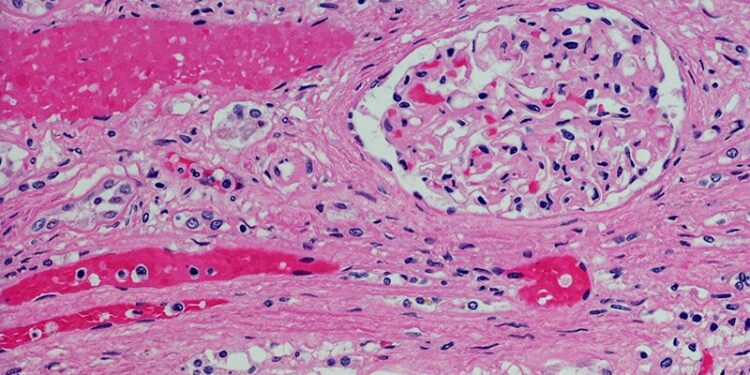[ad_1]
A new urine-based biomarker test could cut in half the need for surveillance imaging to detect recurrence of the most common form of kidney cancer, researchers reported at the 2025 annual congress of the European Association of Urologists.
The “GAGomes” test, which uses mass spectrometry to look for a class of polysaccharides called glycosaminoglycans (GAGs) in urine, can rule out a return of clear cell renal cell carcinoma (ccRCC) with a negative predictive value of 97%, according to Saeed Dabestani, MD, PhD, associate professor at Lund University, Lund, and consultant urologist at Kristianstad Central Hospital, Kristianstad, Sweden.
“If the test result is negative, there’s a 97% chance the patient truly doesn’t have a recurrence. Because of this, when the test is negative, we can feel confident that the patient is recurrence-free and may not need immediate CT imaging,” Dabestani told Medscape Medical News. “That’s how the test allows us to safely space out imaging intervals — for example, doing CTs every 6 months instead of every 3 — hence the conclusion that CT scans could potentially be reduced by half” by using the biomarker test.
For the study, Dabestani and his colleagues enrolled 134 patients with ccRCC treated at 23 hospitals in the United Kingdom, the European Union, the United States, and Canada.
All participants had undergone surgery to resect ccRCC confined to the kidney, and most had the affected organs removed. Following surgery, subjects underwent routine CT scans every 6-12 months depending on their risk for recurrence, and urine samples were taken every 3 months or at time of a recurrence.
Patients were followed-up for up to 18 months, with 16% experiencing a recurrence.
“The GAGome score was very good at detecting patients who had a recurrence on imaging, correctly identifying 90% of them. However, it also incorrectly flagged about half of the patients who didn’t actually have a recurrence,” Dabestani said.
Maria Carmen Mir, MD, PhD, a urologic oncologist at University Hospitals La Ribera in Valencia, Spain, who specializes in kidney surgery, said she was impressed with the development of a suite of biomarkers, rather than a single marker, with a high negative predictive value.
“If the test comes back negative, you can be more or less sure there is no cancer recurrence, but if it’s positive, then we need to look further,” Mir said, adding more research is needed to determine if the urine test can save lives.
David Schulsinger, MD, an associate professor of urology at Stony Brook University Hospital in New York, said the advantages of the new test is that it is highly sensitive, cost-effective, and may minimize the potential harms of repeated x-rays and radiation.
But he said change will not come easily.
“CT scan is the most accurate test. It is the gold standard by which we follow patients who have undergone radical or partial nephrectomy” for kidney cancer, Schulsinger said.
Dabestani said patients are now being recruited for a validation study. He said Elypta, the Stockholm-based manufacturer of the biomarker assay, hopes to obtain regulatory approval for the test in the United States by 2026. However, the test has not yet been approved for clinical use in diagnostic procedures, and further research will be required to confirm its effectiveness in clinical practice.
Dabestani serves as a medical adviser for Elypta. No other relevant conflicts were reported. Elypta is funding the research, which also is partially funded through the European Union Horizon 2020 program.
Howard Wolinsky is a medical writer in Chicago.
[ad_2]
Source link : https://www.medscape.com/viewarticle/urine-test-may-aid-kidney-cancer-follow-2025a100070j?src=rss
Author :
Publish date : 2025-03-25 08:58:00
Copyright for syndicated content belongs to the linked Source.














